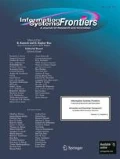Abstract
The Singerian model of inquiring organizations is reviewed (Proceedings of the Americas Conference on Information Systems, Phoenix, Arizona Aug. 16–18,1996:443–445; Australian Journal of Information Systems, 1998;6(1):3–15, reprinted in Foundations of Information Systems: Towards a Philosophy of Informative Technology, http://www.cba.uh.edu/~parks/fis/fisart.htm.) and two cases of organizations representing the Singerian approach are analyzed. The Singerian organization, based on Churchman's (The Design of Inquiring Systems: Basic Concepts of Systems and Organizations, New York, NY: Basic Books Inc., 1971.) Singerian inquiring system, has ethical purposes, treats employees, customers and other stakeholders with trust and respect, and pursues socially responsible goals, including a respect for the environment. Decision making in Singerian organizations is holistic and systemic, and includes diverse stakeholders, thus requiring an open, cooperative culture, wherein debate is encouraged. Authority is diffuse. Measurement is fundamental. A system of measures is continuously monitored, refined, compared and revised to assess progress. Cooperation and communication are supported with various types of groupware, including e-mail, electronic meeting systems, group support systems, negotiation support systems, discussion forums, knowledge bases, knowledge management systems and the like. The Internet and World Wide Web may serve as resource and dissemination agents for “exoteric” knowledge created by the organization. Two organizations, an Energy Service Company and an academic Center for the Management of Information Systems, are analyzed for their conformance to and success with the Singerian approach. The organizations tended to prosper when the model was followed, but ran into difficulties when it was not.
Similar content being viewed by others
References
Argyris C, Schön D. Organizational Learning II. Reading, MA: Addison-Wesley, 1996.
Churchman CW. The Design of Inquiring Systems: Basic Concepts of Systems and Organization. NewYork, NY: Basic Books, Inc., 1971.
Courtney JF. Decision Making and Knowledge Management in Inquiring Organizations: Toward a New Decision-Making Paradigm for DSS. Decision Support Systems, forthcoming.
Courtney JF, Croasdell DT, Paradice DB. Inquiring Organizations. 3 page abstract. Proceedings of the Americas Conference on Information Systems, Phoenix, Arizona, Aug. 16–18,1996: 443–445.
Courtney JF, Croasdell DT, Paradice DB. Inquiring Organizations. Australian Journal of Information Systems, 1998; 6(1):3–15, and reprinted in Foundations of Information Systems: Towards a Philosophy of Information Technology, Available: http://www.cba.uh.edu/~parks/fis/fisart.htm.
Croasdell DT, Courtney JF, Paradice DB. Singerian Inquiring Organizations: Guiding Principles and Design Guidelines for Learning Organizations. Proceedings of the Americans Conference on Information Systems, Baltimore, Maryland, August 14–16, 1998.
DiBella AJ. Developing Learning Organizations: A Matter of Perspective. Academy of Management Journal, Iss. Best Paper Proceeding 1995;287–290.
Huber G. Organizational Learning: The Contributing Processes and Literature. Organization Science 1991;2:88–115.
Kienholz A. Systems ReThinking: An Inquiring Systems Approach to the Art and Practice of the Learning Organization. Foundations of Information Systems: Towards a Philosophy of Information Technology. Available: http://www.cba.uh.edu/~parks/fis/fis.htm, 1998.
Malhotra YB. Knowledge Management in Inquiring Organizations. Proceedings of 3rd Americas Conference on Information Systems, Indianapolis, IN, August 15–17, 1997;293–295.
Mason RO. A Dialectical Approach to Strategic Planning. Management Science 1969;15(8):B403-B414.
Mitroff I. A Communication Model of Dialectical Inquiring Systems-A Strategy for Strategic Planning. Management Science 1971;17(10):B634-B648.
Mitroff I, Betz F, Mason RO. A Mathematical Model of Churchmanian Inquiring Systems with Special Reference to Popper's Measures for ‘The Severity of Tests’. Theory and Decision, 1970;1:155–178.
Mitroff II, Linstone HA. The Unbounded Mind: Breaking the Chains of Traditional Business Thinking. New York: Oxford University Press, 1993.
National Association of Energy Service Companies, Available: http://www. naesco.org.
Nevis EC, DiBella AJ, Gould JM. Understanding Organizations as Leaning Systems. Sloan Management Review1995;36:73–85.
Senge P. The Leader's NewWork: Building Learning Organizations. Sloan Management Review 1990;Fall:7–22.
Author information
Authors and Affiliations
Rights and permissions
About this article
Cite this article
Richardson, S.M., Courtney, J.F. & Paradice, D.B. An Assessment of the Singerian Inquiring Organizational Model: Cases from Academia and the Utility Industry. Information Systems Frontiers 3, 49–62 (2001). https://doi.org/10.1023/A:1011449620792
Issue Date:
DOI: https://doi.org/10.1023/A:1011449620792




